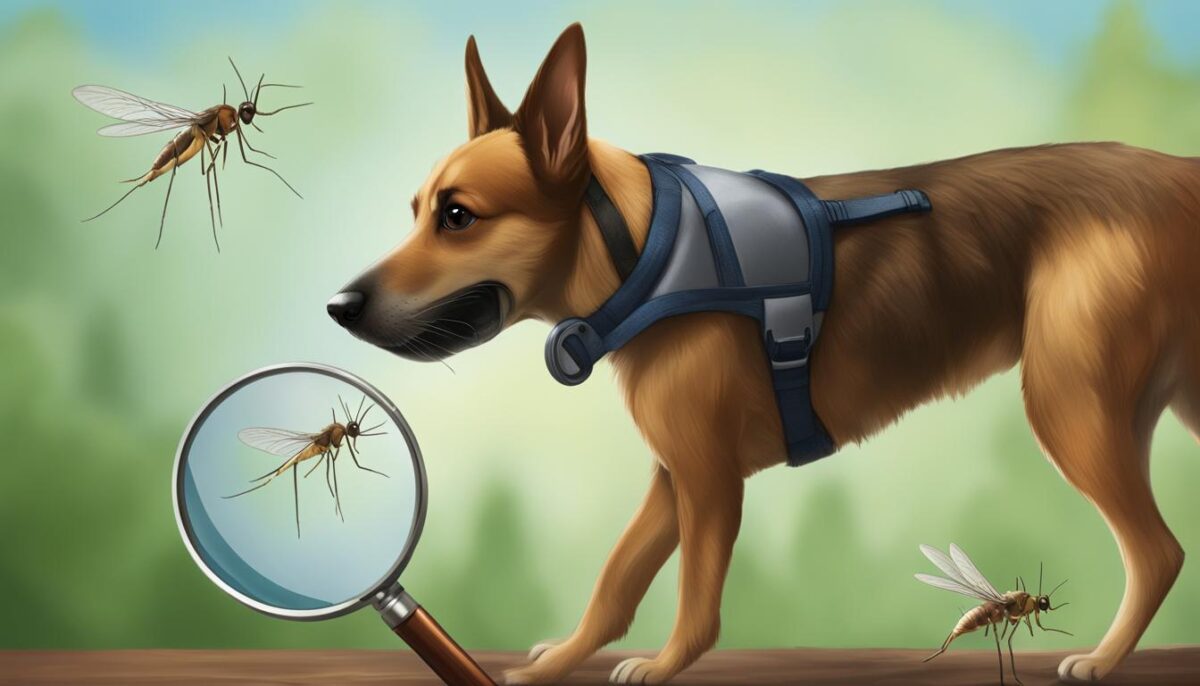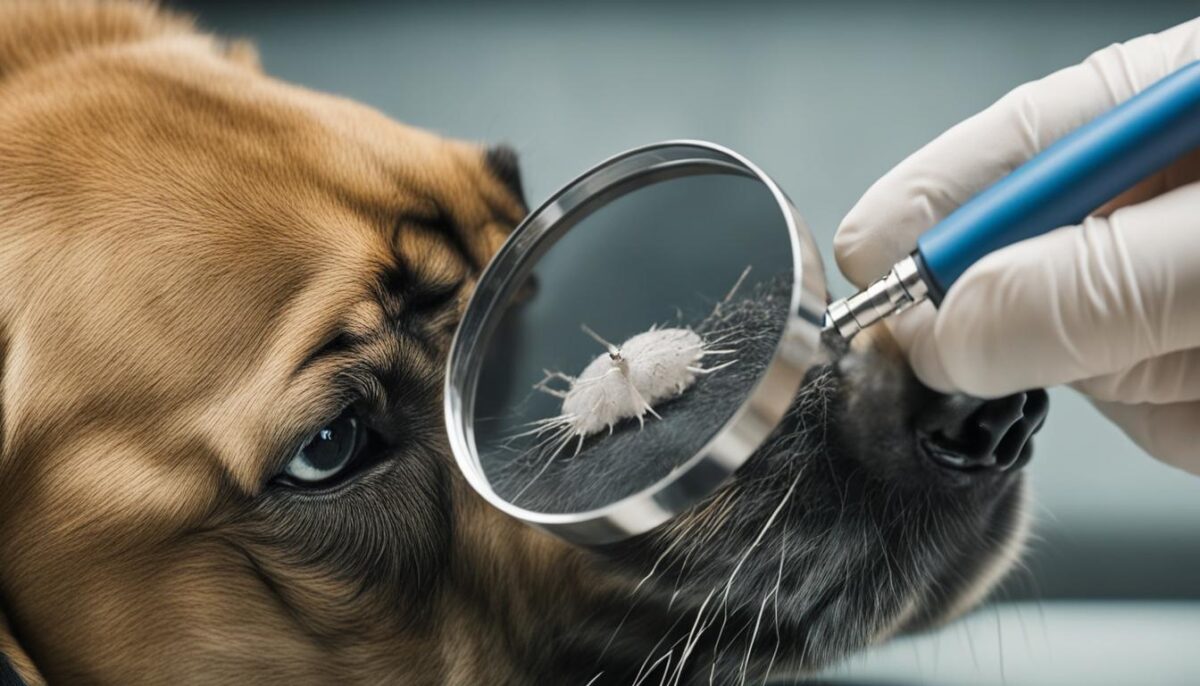Warm days often mean fun outside with your furry friend. But did you know that when you’re outside, mosquitoes can bite your dog just like they bite you? Even dogs with thick fur are not completely safe. Your four-legged pal can feel pain and itchiness, just like humans do when bitten by mosquitoes. Plus, these bites can bring more trouble than just an itch, as they may lead to diseases like heartworm. This is why it’s very important to know how to protect dogs from mosquitoes and ensure canine mosquito bite safety.
As a caring pet owner, you have the power to pet care for mosquito bites. This includes giving them medicine to prevent heartworm and keeping an eye out for any signs of mosquito bites. Remember, looking after your pet’s health is key, and preventing mosquito bites is a big part of this. So let’s make sure our dogs are safe and happy, by stopping those pesky mosquitoes from biting them!
Key Takeaways
- Mosquitoes can bite dogs, causing pain and irritation.
- Thick fur doesn’t fully keep mosquitoes away from your dog’s skin.
- Preventing mosquito bites helps protect dogs from heartworm disease.
- Keeping a close watch on your dog after bites can prevent further issues.
- Heartworm prevention medication is a must for canine health.
Understanding Mosquito Bites on Dogs
Mosquitoes might like to buzz around and might even land on your furry friends. Why? Because these bugs aren’t picky, and your pets are just as cozy to land on as you are. When mosquitoes bite, they can make dogs itch with small bumps. You might see these more on dogs with short hair.
Are Mosquitoes Attracted to Dogs?
It’s true, mosquitoes don’t care if it’s a human or a dog; they just like to bite. So, mosquito attraction to pets is something to watch for, because they can bite your pets when they’re outside.
Identifying Mosquito Bites on Canine Skin
Seeing mosquito bites on your dog’s skin can be important. A mosquito bite usually looks like a tiny, raised, and sometimes red bump. It’s much easier to see this on dogs that don’t have long hair.
| Signs of a Mosquito Bite | What You Might Notice |
|---|---|
| Size | Small, round, and puffy |
| Color | Reddish or a bit pink |
| Behavior | Your dog may scratch or lick the spot |
The Reaction of Dogs to Mosquito Bites
Just like us, dogs can feel itchy after a mosquito bite, but some dogs may not mind as much. A few dogs get really itchy and try to scratch or lick the spot to feel better. This itchy feeling should not last too long, just a couple of hours to maybe a day. If it goes on longer, then it might be something else. If your dog seems very itchy or the spot looks weird, it might be time to chat with the vet. They’ll know what to do and can help your dog feel better.
Can Dogs Get Mosquito Bites and Their Health Implications
As a caring pet parent, you should know about the health risks of mosquito bites in pets. Mosquitoes can bite our furry friends just like they bite us. When a mosquito bites your dog, it can be more than just an itchy spot. They might get sick from mosquito-borne diseases in dogs, and it’s something to think about in warm weather.
Mosquito bites can cause problems like infections and itchy spots called hot spots. Some dogs might even have a big reaction, like an allergic reaction. But the biggest worry is a sickness called heartworm disease. This is where tiny worm babies get into your dog’s blood and then grow up to cause big trouble for their heart and other parts of the body. It’s important to use medicine to keep these worms away from your dog. And you’ll want to visit the vet every year to make sure everything is okay with your dog’s heart.
Some mosquitoes can carry other nasty bugs that can make dogs really sick, like the West Nile virus. It’s pretty rare for dogs to get sick from it, but it’s still good to be safe and make sure they’re protected from mosquito bites.
Let’s look at some of the dangers that mosquito bites can bring to your dogs:
- Infections: Scratching a lot can make the spot get infected.
- Allergic reactions: Some dogs might swell up a lot from just one bite.
- Heartworm disease: This is the big one because it can make dogs really sick and it’s hard to treat.
Here’s a table to show you what these problems can do to your dog:
| Problem | What It Looks Like | What It Does |
|---|---|---|
| Infections | Red, swollen skin | Might need medicine to fix |
| Allergic Reactions | Really big swelling | May need to see the vet right away |
| Heartworm Disease | Hard to tell at first | Can ruin dog’s heart and health |
Always remember, the best way to deal with canine mosquito bite dangers is to stop them from happening in the first place. So keep your dog safe with the right medicine and care. If you’re ever not sure what to do, your vet can help.
First Aid for Mosquito Bites on Your Furry Friend
Getting a mosquito bite might seem small, but it’s a big deal for your furry friend. You can help! First, check that they’re on heartworm prevention. Then, keep an eye on the itchiness. Too much scratching isn’t good, so let’s make sure we take care of them the right way!
Initial Steps After a Mosquito Bite
If you see your dog get bitten, the first thing to do is keep calm. You can wash the bite with some soap and water. This helps in treating dog mosquito bites right from the start. But remember, no scratching allowed! To stop that itch and wiggle, try some safe creams that your vet says are okay.
When to Seek Veterinary Care?
Sometimes, a mosquito bite can make your dog feel really yucky. If you see their face or body get super puffy or if they have trouble breathing, it’s time for a quick trip to the vet. Veterinary care for mosquito bites is super important, so don’t wait if things look serious.
Providing Comfort and Preventing Infection
For those itchy spots, a special shirt or even a funny-looking cone can keep your dog from scratching and preventing infection in dogs. And, if it gets really bad, the vet might give some medicine to make the swelling go down and help your buddy breathe better.
| Sign | Home Care | Time to Call the Vet |
|---|---|---|
| Small, itchy bump | Gentle wash, itch cream | If signs persist or worsen, or difficulty breathing occurs |
| Scratching a lot | Distraction, cold compress | |
| Skin looks red or sore | Clean area, cone of shame |
Proactive Measures: Heartworm Prevention and More
Keeping your pup happy and healthy means keeping those pesky mosquitoes away. It’s not just about stopping itchy bites; it’s about stopping heartworms too. These worms can make dogs really sick, so using heartworm medication is super important for all dogs.
Importance of Heartworm Medication
Just like you take medicine to stay healthy, your dog needs medicine to fight off heartworms. Giving your dog heartworm medication is one of the best ways to protect them. It’s a key part of pet care to prevent those dangerous worms from making a home in your dog’s heart.
Choosing the Right Preventive Products
There are lots of sprays and medicines to keep mosquitoes from bothering your dog. Talk to your vet about selecting mosquito repellents for pets. They can help you find a safe choice like K9 Advantix® II. It keeps mosquitoes from biting your furry friend in the first place.
Regular Vet Check-ups for a Healthy Dog
Visiting the vet for check-ups is another way to make sure your dog stays well. Your vet can do a check called veterinary heartworm screenings. These tests help find out if your dog has heartworms early, so they can get better quickly. Remember, you’re the best friend your dog has, and taking these steps is a big part of keeping your best friend feeling paw-some!
FAQ
Can Dogs Get Mosquito Bites?
Yes, dogs can get mosquito bites. Mosquitoes are not selective and will bite dogs if given the opportunity. It’s important to protect dogs from mosquitoes and be aware of canine mosquito bite safety.
Are Mosquitoes Attracted to Dogs?
Mosquitoes can be attracted to dogs just as they are to humans. Their attraction is due to cues like body heat, movement, and exhaled carbon dioxide. Pet care for mosquito bites is essential for all dog owners.
How Can I Identify Mosquito Bites on My Dog’s Skin?
Mosquito bites on dogs can look like small, raised, itchy welts. They are often more noticeable on short-haired breeds, but you should inspect your dog’s skin closely, especially if they seem to be scratching more than usual.
How Do Dogs React to Mosquito Bites?
Dogs can have varying reactions to mosquito bites, ranging from minor irritation to more significant itching and discomfort, which can lead to scratching and potentially hot spots or infections.
What Are the Health Risks of Mosquito Bites in Pets?
Beyond irritation, mosquito bites can pose health risks to pets, including infections and the transmission of diseases like heartworm and, rarely, West Nile virus. It’s critical to understand the mosquito-borne dangers and take precautionary measures.
What Should I Do If My Dog Gets Bitten by a Mosquito?
After a mosquito bite, check your dog for signs of excessive scratching or discomfort. Ensure your dog is up to date on heartworm prevention. For uninfected bites, you might use vet-recommended itch-relief products to alleviate discomfort.
When Should I Seek Veterinary Care for My Dog’s Mosquito Bite?
Seek immediate veterinary care if your dog shows signs of an infection, an allergic reaction such as excessive swelling or difficulty breathing, or if the itching and discomfort persist for more than a day.
How Can I Provide Comfort and Prevent Infection in My Dog After a Mosquito Bite?
To prevent further irritation and potential infection, you can apply vet-recommended products to soothe the itch, and use an Elizabethan collar to stop them from scratching the bite area. Keeping the area clean is also important for preventing infection.
Why Is Heartworm Medication Important for My Dog?
Heartworm medication is crucial for preventing heartworm disease, which is transmitted through mosquito bites. It’s an essential part of pet care to protect your dog’s heart and overall health from the serious effects of heartworms.
How Do I Choose the Right Mosquito Repellent for My Dog?
Work with your veterinarian to find pet-safe mosquito repellents and products like K9 Advantix® II that are designed to provide long-term protection against mosquitoes. Make sure any product you use is specifically made for dogs and vet-recommended.
How Often Should I Take My Dog for Veterinary Heartworm Screenings?
It’s recommended to take your dog for annual heartworm screenings to catch any infection early. Regular veterinary visits are part of proactive pet health care and can help detect heartworm and other mosquito-borne diseases.


